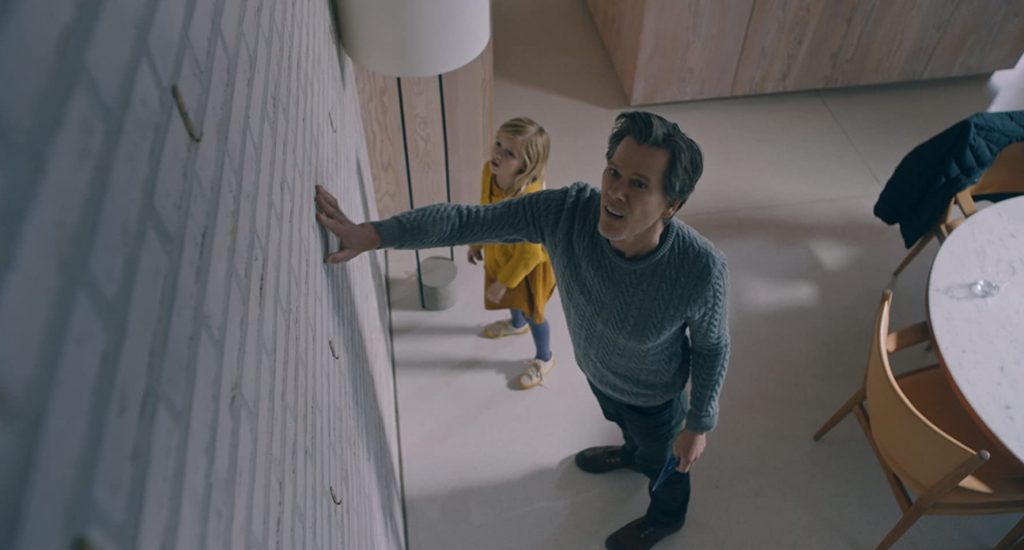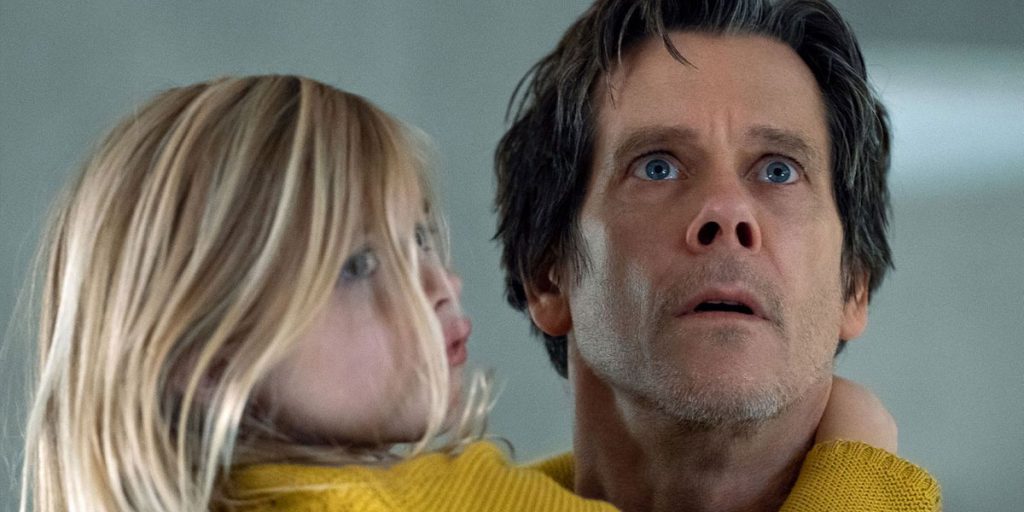You Should Have Left fails to incite fear of any kind, with a story that’s more sleep-inducing than scary.
Given that Kevin Bacon secured one of his first major movie roles in 1980’s Friday the 13th, it only makes sense that the much-adored actor would have a bit of a soft spot for the genre that helped kickstart his career. Over the years, he’s starred in creepy classics such as Flatliners, Tremors, and Hollow Man, along with 1999’s Stir of Echoes, which was his first frightful collaboration with You Should Have Left ’s writer-director, David Koepp. Unfortunately, You Should Have Left does not earn a place amongst those fondly remembered features, as Bacon and Koepp are unable to replicate the manic magic of their prior pairing, resulting in a dull and disappointing affair that inexplicably feels both drawn-out and underdeveloped.
The sluggish story in You Should Have Left is set in motion as Theo Conroy (Bacon), a formerly successful banker, moves to a quaint and quiet modern mansion in the English countryside with his daughter (Avery Essex) and his actress wife, Susanna (a fine Amanda Seyfried, of Mamma Mia and Mean Girls). Theo and Susanna attempt to use this respite to repair their rocky relationship – which is scarred by Theo’s domineering distrust and Susanna’s selfishness – but as the house seemingly starts to supernaturally probe the pains of Theo’s psyche and toy with the troubles of times past, his descent into delusion proves that this family’s problems are only just beginning.
To be fair, it should at least be noted that You Should Have Left certainly looks lovely, thanks to the talented work of production designers Sophie Becher (BBC’s And Then There Were None) and Megan Elizabeth Bell (go90’s Golden Revenge), who magnificently bring this maze-like mansion to life, and the luscious lensing from cinematographer Angus Hudson (Cashback, Last Passenger), who leans on a legion of lighting tricks to shape the sinister shadows that appear in almost every scene. In spite of the film’s many flaws, the atmosphere always remains alluring, and as characters continually cross through this horrifying house’s constantly changing corridors, the crew tries their hardest to illustrate some intriguing and intimidating imagery.

However, aside from You Should Have Left’s visual virtuosity, there’s nothing else of value for viewers in this stuffy and slowly paced slog. Though Koepp is responsible for scripting supreme blockbuster box-office successes such as Jurassic Park, Spider-Man, and Mission: Impossible, here, he adapts Daniel Kehlmann’s nerve-racking novella of the same name into a languid and lifeless lark that lacks any sense of suspense whatsoever. In fact, the plot is less of a structured story and more of a scattered collection of stale “jump-scare” sequences, in which characters repeatedly encounter the house’s traps and tricks in dreams or hallucinations for what feels like an eternity. It can be debated as to whether the film’s formlessness is a result of shaky screenwriting or incompetent editing (with a runtime of 93 minutes, of which 10 minutes are devoted to credits, the movie was clearly cut to the bone), but that doesn’t change the fact that the final product feels so perplexing and purposeless.
While the film’s first half is flat and overly familiar, it’s still surprisingly watchable, and it sets up some thought-provoking story threads (particularly about the dark demise of Theo’s first wife, which many believe he had a hand in). Unfortunately, by the 40-minute mark, when Bacon’s Theo is left randomly roaming the halls of the house while madly mumbling to himself until the film’s frustrating finale, the movie loses any momentum it previously possessed, and audiences have zero attachment to any activities taking place onscreen. A horror movie doesn’t always have to explain all its eccentricities, but when the events in You Should Have Left are this insanely incomprehensible, one has to wonder if Koepp just didn’t put in the effort to offer any explanations or if essential context was left on the cutting room floor.
Bacon undoubtedly commits to his character, channeling the temperament of Jack Torrance (as the film so openly wishes to ape The Shining’s themes of isolation and insanity), but the script rarely gives him an opportunity to do anything aside from rote raving and rambling. Even worse, though Theo’s ultimate fate can be seen coming from a mile away, You Should Have Left refuses to engage with any of the implications of its dour denouement and instead immediately ends after an allegedly “astonishing” announcement, abandoning any of the stirring social subtext it had set up at the start.
Whether the agonizing ambiguity and aimlessness of You Should Have Left was caused by a subpar script or ineffective studio interference, the end result remains lackluster and listless all the same. Those searching for summer scares best look elsewhere, as the only thing startling about this story is its staleness.
You Should Have Left is now available to watch on Demand everywhere.

